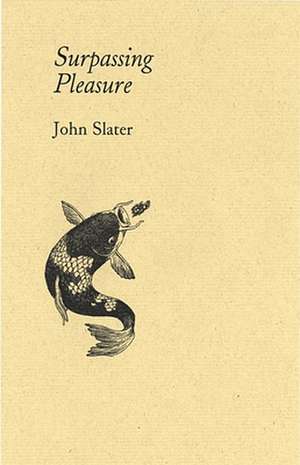Surpassing Pleasure
Autor John Slateren Limba Engleză Paperback – 31 mai 2011
Preț: 89.68 lei
Nou
Puncte Express: 135
Preț estimativ în valută:
17.16€ • 17.81$ • 14.34£
17.16€ • 17.81$ • 14.34£
Carte indisponibilă temporar
Doresc să fiu notificat când acest titlu va fi disponibil:
Se trimite...
Preluare comenzi: 021 569.72.76
Specificații
ISBN-13: 9780889843400
ISBN-10: 0889843406
Pagini: 109
Dimensiuni: 140 x 218 x 13 mm
Greutate: 0.2 kg
Editura: Porcupine's Quill
ISBN-10: 0889843406
Pagini: 109
Dimensiuni: 140 x 218 x 13 mm
Greutate: 0.2 kg
Editura: Porcupine's Quill
Notă biografică
Recenzii
'In the general silence of a Cistercian abbey, one might hope for the numinous to reveal itself-and so it does in John Slater's poems. From the very first poem in this first collection, Slater, a Cistercian monk, promises that "here in the green world between / eternal fields of light" there will be "...ample, empty, time / to acknowledge / all that is passing...", and further, he will "...clean / with an invisible rag / the dusty windshield" that can divide people and cloud vision. His poems limn the odd and beautiful connections that characterize the divine, and summon the quality of attention required to notice it.'Slater leads with transformation, front-loading the book with poems set in the snooker hall, the abbey, the porch, the bottom of the sea. It doesn't matter where; insight can bloom anywhere, any time. Like the "tiny controlled explosions" of the snotflower decomposing a whale's underwater skeleton (in "Defused"), Slater's poems work on the world, digesting it, turning it into small units of light and sound that point toward God.'These poems take their time. For the most part, they are one-pagers, carefully crafted and beautifully controlled, whether in free verse or in form. They don't overreach. And, as Slater writes, reverence is "the source for every poem", even when he's writing about stealing cigs.'The poems move inward as the collection progresses, gradually revealing personal history, first told at some distance, then distilling into poems of loss in the third section. In the sonnet "Rear-view", one glimpses the man behind the poems: moving into a detached and spiritual life, leaving behind a loved one whom he will never quite forget: "...You remain on my mind, / Impossible to hold, or leave behind". This seems to be the emotional center of gravity for the book.'Except that it is replaced by another emotional center, the final section, which includes both translations of the Persian poet Hafiz and Slater's own work, poems of searching and yearning for the beloved, the divine beloved. In the final poem, "Unlocked", the speaker addresses another, noting "...Loss / held in the mouth / like the clean smoke /of incense; snow under- / foot, our unlocked / cars, and the still / half-built apartments / left open to the cold".'No resolution here, but the invocation of a new emptiness. The resulting impression is of a man, still searching, hungry, unfinished, on his way somewhere, leaning against the car for a moment before he resumes his journey. One can't help feeling that there will be something more-perhaps something less tidy and composed-to come one day from John Slater.' -- Teresa Scollon Forewordreviews.com Slater strives to make his own path from the secular to the sacred, finding subtle existential lessons in commonplace experiences. -- Barbara Carey Toronto Star
